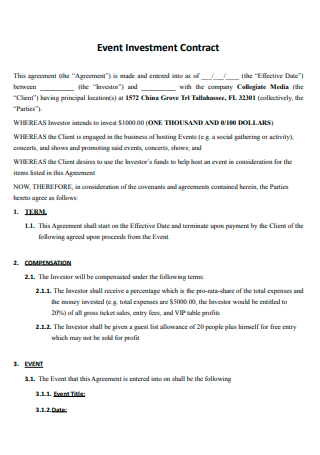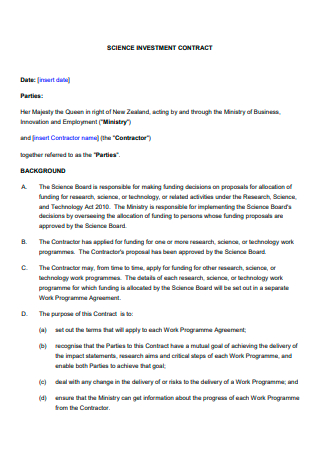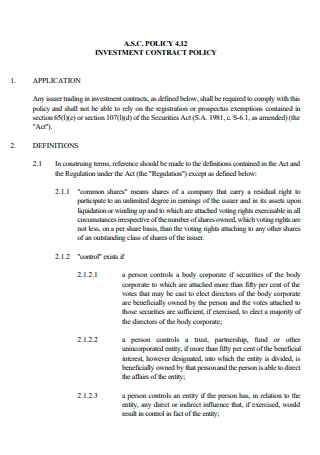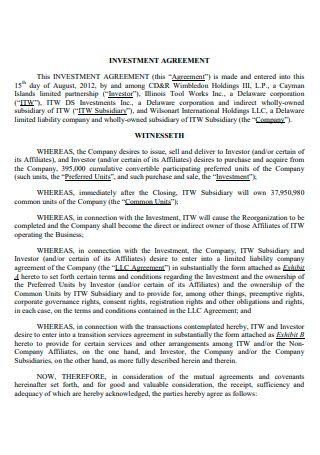3+ Sample Event Investment Contract
FREE Event Investment Contract s to Download
3+ Sample Event Investment Contract
What Is an Investment Contract?
Benefits of Event Investments
Tips to Start a Business in Event Planning
How to Obtain Financial Support for an Event
FAQs
What is an equity event?
How do liquidity events work?
What is Micro investing?
What Is an Investment Contract?
Any debt obligation not excluded by the definition of an investment contract in the subsection is an investment contract. For instance, a debt obligation that stipulates at least annual interest payments is not an investment contract because the investment contract definition excludes it. In addition, an investment contract is a written agreement with a financial institution in which the funds are invested for more than one year. The accumulated interest on the funds invested is only paid at maturity. According to the statistics, only 20% of investment professionals are successful investors. Success could be defined as generating returns comparable to or greater than the average stock market profits.
Benefits of Event Investments
Planning events requires considerable effort. Whether hosting or joining the event, your business will benefit greatly. If you are undecided about investing in events, consider the following benefits.
Tips to Start a Business in Event Planning
When starting a business that plans events, there are many things to consider. To help you figure out how to start your business, I wanted to share a few key things that were important to me while researching and creating a successful event business!
1. Build a solid business plan
I cannot count the number of small event-planning businesses that failed because their founders lacked a business plan. Start by researching comparable successful business plans and organizations. Then, talk to others in the events enterprise who might be able to assist! Even if you have never seen a business plan, numerous resources and templates are available online to help you get started. In addition, if you intend to expand your business, you must have a current business plan to secure any investment.
2. Set aside money for marketing and hire a PR company if you can.
When launching a party planning business, your marketing budget may comprise 30 percent or more of your total startup costs. Don’t forget anything! Ultimately, you must spend money to earn money. During the first few months, the objective is to secure as many customers as possible. If you deliver on your promise to create memorable events, your clients will remain loyal and refer you to others. Consequently, your marketing expenses will begin to decline.
3. Define your event business’s scope, mission, and goals.
Even if your event planning business evolves, it’s essential to define what you are and are not willing to do from the beginning. You can even include this on your website to attract the ideal customers. When you are still building your business, one of the most challenging things is to say “no” to clients. However, it may prevent you from dealing with customers who consume too much of your time and provide low value.
4. Have your elevator speech ready.
After you established my first events business, it was difficult for you to sell it to customers because my 30-second pitch wasn’t polished. This is the key to introducing everyone to your business, so devote ample time to its development. Don’t fret over the name of your event planning company. Your business’s name is irrelevant if you produce genuinely unforgettable events. During an elevator pitch, a memorable event business name may be more likely to stick in a person’s mind.
5. Conduct market research and devote some time to studying tax law
Before diving in, I advise individuals to investigate their market and competitors. What is your unique value proposition? Are your rates comparable to, higher, or lower than those of competitors in your area? Knowing your competition and customers will give you an advantage in this market. Do not bypass this step! Also, regardless of the type of company you intend to launch, numerous legal aspects exist to comprehend. Before investing, it is also essential to understand the tax implications. There is much to navigate, but there are some excellent resources for building small businesses.
How to Obtain Financial Support for an Event
Unfortunately, coming up with an idea for a fantastic event is easy. You will frequently need substantial money to bring your dream to fruition! However, this should not dissuade you; there are numerous ways to finance new events. We have outlined six different ways to finance your event idea, ranging from traditional methods such as bank loans to innovative ones such as crowdfunding; choose one or combine them to secure the funds you require. Estimate your event’s costs and how much you can realistically raise from each funding source before you begin.
1. Crowdfunding
Crowdfunding platforms have made it much easier for event organizers to test the demand for new events, allowing them to try out ideas before risking money. You describe your fantastic new event, set a fundraising goal, and ask potential attendees to pledge to purchase tickets if the event occurs. The promised funds are returned if there is insufficient interest and you do not reach your destination. Therefore, it is a risk-free “investment” for the attendees and the organizer, who does not have to risk their funds. However, although the process is straightforward, attracting ticket buyers is not always as simple. You will need to contact everyone you know to spread the word about your campaign, launch an assault on social media, and devote substantial time and resources to marketing.
2. Angel Investor
Angel investors are wealthy people or groups seeking investment opportunities. Some websites can help you connect with investors through personal introductions or pitching events. You could also approach existing contacts who know and trust you, highly targeted individual investors, or specialized investment groups to find an investor. Suppose you want to launch a conference about cleantech innovations, for instance. In that case, you should approach an investor with a track record in energy, not someone who typically invests in real estate.
3. Savings and Bank Loan
Also known as the option to “put your money where your mouth is,” Consider your financial resources to determine how much money you or your organization can contribute to the budget. Exposing yourself to a specific risk can demonstrate your dedication and encourage other investors, sponsors, and partners to join you. Also, banks do not grant loans as quickly as they once did and are unlikely to lend against an event, but a business loan may be an option if your company has a proven track record. Alternatively, you can borrow against an existing investment, such as your home. Still, unless you are 100 percent confident that your event will be successful, you should consider this option before committing.
4. Advance ticket sales
Using an event-ticketing platform, you can begin selling tickets for your event well before its scheduled date. This allows you to measure the desirability of your event concept but also provides you with working capital. If you are organizing an event, you are eligible to apply for advance payment to receive payment before your event occurs. You can receive a portion of advance ticket sales twice per month, giving you vital cash flow to get your task off the ground.
5. Sponsorship
Corporate sponsorship is highly effective for essential funding aspects of your event, and most events utilize it. Nevertheless, sponsors typically sign on after your event has been launched. Sponsors will want to know how many individuals will attend your event, when and where it will occur, the plan, and your marketing strategy. Before approaching sponsors, it will likely be necessary to secure some initial funding or to have a sufficient number of attendees registered. Ensure you have finalized your sponsorship packages and know the benefits you can offer sponsors at that time.
6. Sale of Exhibition Space and Barter
Similarly to how you can pre-sell event tickets, you can also pre-sell exhibition stands and collect deposits from exhibitors. You can sell space for hundreds of pounds per square meter, raising a significant amount of capital by recruiting exhibitors early. However, attracting exhibitors will be difficult as a new show with no track record. Offer early bird discounts to entice your first few exhibitors through your existing network. You can then use their support to persuade others of the legitimacy of your event. Also, do not undervalue in-kind funding. What can you or your business offer in exchange for the required goods and services? For instance, a magazine hosting a reader event could offer a catering company free print advertising in exchange for food and beverages. Alternatively, you can provide partners with the chance to participate in the event itself, such as by negotiating a discount from the venue in exchange for allowing them to give a presentation. The more brands and partners you collaborate with to host your events, the more money you can save.
FAQs
What is an equity event?
Equity Event refers to the closing and completion of a private placement of common or preferred stock of the Borrower or equity securities convertible into common or preferred stock of the Borrower, as applicable, to professional or institutional investors or other investors who may lawfully purchase such securities.
How do liquidity events work?
A liquidity event is when a company’s founders and early investors can turn their non-liquid shares into cash. This can happen through an IPO or a direct purchase by another company. Investors who put money into a new business expect to get their money back in a reasonable amount of time.
What is Micro investing?
Micro investing is supporting in minimal amounts by purchasing fractions of shares. Micro-investing allows you to maximize your money’s growth potential and give your savings a chance to beat inflation. Investing can help reduce the average amount spent per share.
Due to the importance of having this Event Investment Contract on hand at all times, it is also crucial to be of the highest quality, as this will promote your business and solidify agreements between you and your client. Therefore, having this readily available is a significant selling point for anyone interested in purchasing and promoting your products and services.




